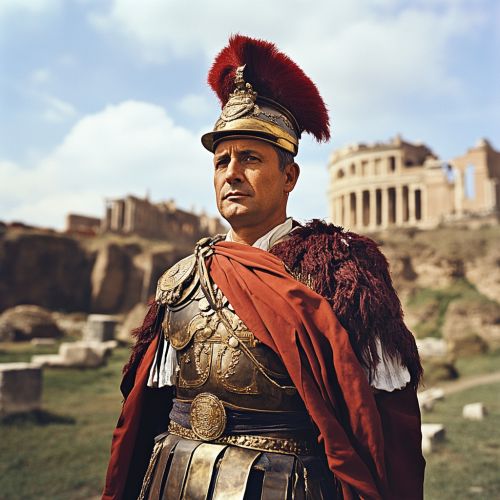Roman procurator
Introduction
The role of the Roman procurator was a significant administrative position within the Roman Empire, primarily responsible for financial and judicial duties in the provinces. These officials were appointed by the emperor and were integral to the efficient management of the vast territories under Roman control. The procurators played a crucial role in maintaining the economic stability of the empire, overseeing tax collection, and ensuring the implementation of imperial policies.
Historical Context
The position of the procurator emerged during the late Roman Republic and became more prominent under the reign of the first Roman emperor, Augustus. As the empire expanded, the need for a more structured and efficient administrative system became apparent. Augustus initiated reforms that led to the establishment of the procuratorial system, which allowed for greater control over the provinces and facilitated the centralization of power.
The procurators were typically members of the equestrian order, a social class just below the senatorial rank. This choice was strategic, as equestrians were considered more loyal to the emperor and less likely to have political ambitions that could threaten imperial authority. The procuratorial system was part of a broader effort to professionalize the administration of the empire and reduce the influence of the senatorial class.
Duties and Responsibilities
Financial Administration
One of the primary responsibilities of a Roman procurator was the management of provincial finances. This included the collection of taxes, rents, and other revenues owed to the state. Procurators were tasked with ensuring that the financial resources of the province were efficiently utilized and that any surplus was remitted to the imperial treasury. They were also responsible for overseeing the minting of coins and the regulation of local markets.
Procurators had to maintain detailed records of all financial transactions and report regularly to the emperor. This required a high degree of literacy and numeracy, as well as an understanding of complex financial systems. The role of the procurator was crucial in maintaining the economic stability of the empire, as any mismanagement could lead to unrest and rebellion.
Judicial Functions
In addition to their financial duties, procurators also had judicial responsibilities. They acted as judges in civil and criminal cases, particularly those involving Roman citizens or matters of imperial interest. Procurators had the authority to enforce imperial decrees and ensure that local laws were in alignment with Roman legal standards.
The judicial role of the procurator was particularly important in provinces where the local population had limited access to Roman legal institutions. By acting as a representative of the emperor, the procurator helped to integrate the provinces into the Roman legal system and promote the rule of law.
Military Oversight
While procurators were not primarily military officials, they often had some degree of oversight over the provincial garrisons. This included ensuring that the soldiers were paid and supplied, as well as coordinating with local military commanders to maintain security and order. In some cases, procurators were called upon to lead military expeditions or suppress revolts, particularly in provinces where the military presence was limited.
Appointment and Career Path
Procurators were appointed directly by the emperor, often based on their loyalty and administrative skills. The position was typically held for a fixed term, although this could vary depending on the needs of the province and the performance of the individual. Successful procurators could be promoted to higher administrative positions or even enter the senatorial class.
The career path of a procurator was often marked by a series of progressively more challenging assignments. Many procurators began their careers in less significant provinces before being assigned to more important regions. This allowed them to gain experience and demonstrate their capabilities to the emperor.
Impact on Provincial Governance
The presence of a Roman procurator in a province had a profound impact on local governance. Procurators served as the primary link between the provincial administration and the central government, ensuring that imperial policies were implemented effectively. They also played a key role in mediating between the local population and the Roman authorities, addressing grievances and maintaining order.
The procuratorial system contributed to the stability and cohesion of the Roman Empire by providing a consistent and reliable administrative framework. This allowed the emperor to exercise control over distant territories and respond quickly to any challenges or threats.
Challenges and Criticisms
Despite their importance, procurators often faced significant challenges in carrying out their duties. The vast distances and diverse cultures within the empire made communication and coordination difficult. Procurators had to navigate complex local politics and manage relationships with provincial elites, who could be resistant to Roman authority.
The role of the procurator was not without controversy. Some were accused of corruption and abuse of power, using their position to enrich themselves at the expense of the local population. This led to tensions and, in some cases, revolts against Roman rule. The emperor had to carefully monitor the activities of procurators to prevent such abuses and maintain the legitimacy of the imperial administration.
Legacy
The procuratorial system left a lasting legacy on the administration of the Roman Empire. It provided a model for centralized governance that influenced subsequent empires and states. The emphasis on professional administration and accountability set a standard for future bureaucratic systems.
The role of the procurator also highlighted the challenges of governing a diverse and expansive empire. The need for effective communication, cultural sensitivity, and adaptability remains relevant in modern administrative practices.


